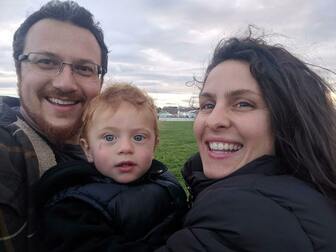 I had a tough day last week. It can be hard wearing so many hats, having a kid who still doesn't sleep through the night, and an absorbing career. I know I am not alone in these struggles. Fortunately I woke up the next morning to a loving and wise note from my husband Albert. He wrote reminding me to share the same love and compassion that I give to others with myself. And boy is he right. Parenting provides so many moments of joy and love and laughter, but also moments of frustration and guilt. We can be so hard on ourselves as parents - for missing time with our children while at work, for lashing out, losing our patience, missing their cues. Beyond our parenting dilemmas there always seems to be something that self-critical voice in the back of our mind is saying, reminding of us of our faults and imperfections. Whatever struggles we are navigating in life - parents or non-parents - it's easy to be hard on ourselves. Self-compassion can help. Self-compassion is a fairly new concept to me. I was exposed to it last year by my amazing colleague Dr. Jonah Paquette, author and Manager of Clinical Training at Kaiser Vallejo. Jonah exposed me to the growing research behind self-compassion and its many surprising benefits, which include:
What is self-compassion? Self-compassion is a way of relating to ourselves kindly and embracing ourselves as we are, flaws and all. According to Kristin Neff, Ph.D. one of the world’s leading experts on self-compassion, there are three core components of self-compassion:
Self-compassion first requires a mindful awareness that we are suffering (rather than ignoring our pain or sticking it out). This elements is key since, as I have written before, research reveals that avoiding our feelings can negatively impact our health. It also involves recognizing that suffering and personal inadequacy is part of the shared human experience – something that we all go through rather than being something that happens to “me” alone. Finally, self-compassion means we are kind and understanding when confronted with personal failings or disappointment instead of judging and criticizing ourselves. One of the health benefits behind self-compassion is a reduction in the stress response. When we are self-critical we activate our body's fight or flight system, releasing stress hormones. As we all know, elevated stress has been associated with a range of negative physical and psychological outcomes. Self-compassion, by reducing self-criticism, may relieve our self-inflicted state of chronic stress. Turning towards compassion stops the broken record of negativity and rumination and moves us towards mindful acceptance. Related to my tough day, additional research shows that self-compassion is an important parenting trait as it increases resilience and coping skills, enhances perspective, forgiveness and compassion for others. As we all know, children are ever so observant so practicing self-compassion (even if it's hard at first) is so important as our children will learn to treat themselves kindly by seeing how we handle our own mistakes. Beyond parenting, self-compassionate people are also less anxious and depressed and have more motivation to change for the better, try harder to learn, and avoid repeating past mistakes (Neff, 2015) Tips for practice Research shows that the more we practice being kind and compassionate with ourselves the more we’ll increase the habit of self-compassion. Of course this is the case with all behavior change! Consistency is key (and so hard!). I myself have only tried a few self-compassion exercises so far. Below is one that I enjoy most from Dr. Neff. As she describes, this practice only takes a minute, can be used any time of day or night, and is available when we need it most – when we fail, make mistakes, or struggle in life. Self-Compassion in Action: The Self-Compassion Break Think of a situation in your life that is difficult, that is causing you stress. Call the situation to mind, and see if you can actually feel the stress and emotional discomfort in your body. Now, say to yourself: 1. This is a moment of suffering (this is the mindfulness part - acknowledging our pain) Other options include:
2. Suffering is a part of life (common humanity) Other options include:
3. Now, put your hands over your heart, feel the warmth of your hands and the gentle touch of your hands on your chest. Or adopt the soothing touch you discovered felt right for you. Say to yourself: May I be kind to myself. You can also ask yourself, “What do I need to hear right now to express kindness to myself?” Is there a phrase that speaks to you in your particular situation, such as:
It is clear that treating ourselves with care and compassion is a powerful way to enhance well-being. I hope you give it a try next time you hear that inner voice of yourself being self-critical. Let me know how it goes!
2 Comments
|
AuthorHello and welcome! My name is Andrea Notch Mayzeles. I am a Certified Health Education Specialist, Mom, and Master of Public Health dedicated to the path of well-being. As a wellness professional I am committed to continued learning and am here to share research, recipes and musings on health, psychology, personal development, and parenting. I hope you enjoy! Categories
All
|

 RSS Feed
RSS Feed